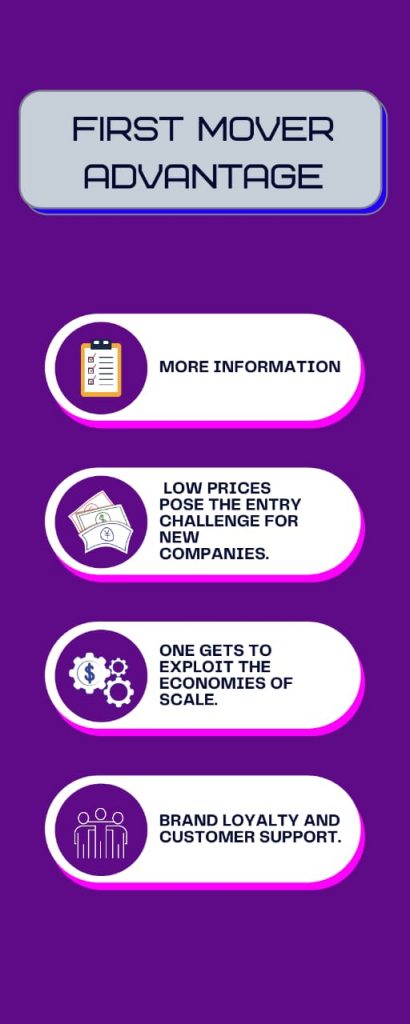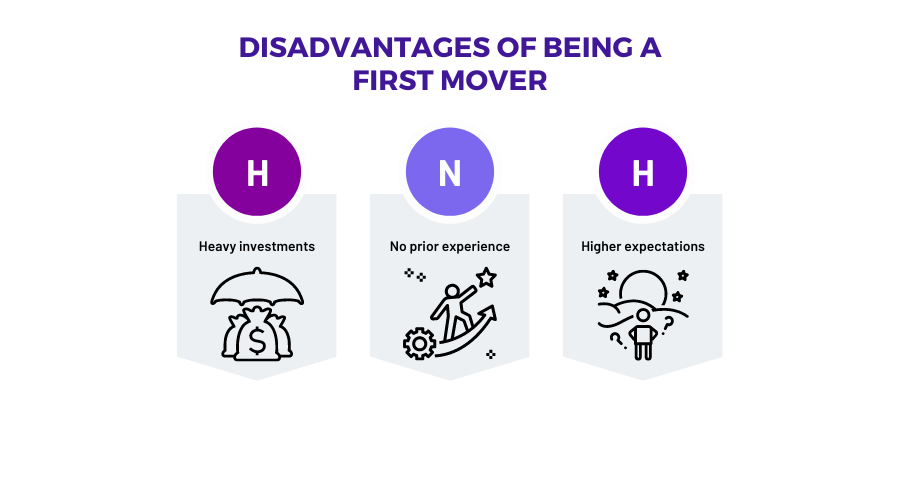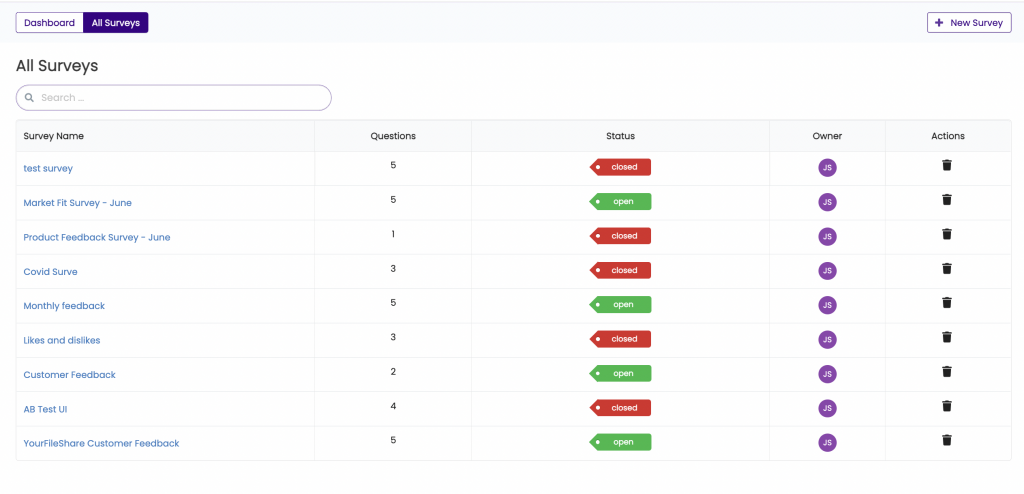
What is the First Mover Advantage?
First Mover Advantage Definition
“First Mover advantage is the competitive advantage gained by a particular company compared to its competitors while launching the products first.“
Simply put, by launching a product first, the company gains some competitive advantages called the “First Mover Advantage.”
The first mover advantage involves gaining a significant chunk of the initial market. It speeds up brand recognition and customer loyalty as there are few competitors to compare it to.
Moreover, it’s the only product that comes to consumers’ minds even with better offers. The product also has additional time to strive for excellence and become better.
The first mover advantage example is SpaceX, the first private space company founded for space research and development of technology to habit other planets. Now, other companies like Blue Origin, Scaled Composites, and more.
However, none received publicity or recognition quite as robust as SpaceX.
There are also first mover disadvantages that you can look at. One example of the first mover disadvantage is Yahoo which could not keep up with its competitors.
Advantages of Being a First Mover
Economies of scale and advantages in learning
The first mover has the opportunity to take advantage of economies of scale. Such an advantage helps it reduce costs while increasing production, leading to a lower sale price than its competitors.
This provides advantages over new entrants and competitors who do not enjoy such benefits.
More information
First movers have advantages because they know more about their market before entering it.
This enables them to identify and react much faster than potential entrants and competitors. That’s because they need time to gather information and decide their entry or exit.
Make prices stick
The first mover takes advantage of new entrants by reducing production costs and expenses.
When they eventually enter, their prices are higher than those of the first mover who makes them stick.
Predatory advantages
The long-term benefits of being a first-mover can be very beneficial in creating barriers for potential entrants.
Firms generally have a significant market share and a strong brand name, which may place future competitors at a disadvantage.
Option advantages
A firm can benefit from its options when establishing itself as a first mover.
Producing high and low volumes helps the first mover limit its risk as it does not depend on one product or service alone to succeed.
Community advantages
By being the first to enter a market, a firm gains benefits in terms of community advantages. The first mover can develop strong relationships with suppliers, customers, and the community where it operates.
Customers must feel valued and heard if you want to develop a strong relationship with them. A leading product management system like Chisel will help you establish strong connections with your stakeholders and customers by capturing their feedback on your products, including their features and ratings.
Possesses advantages over its future competitors in terms of resources and information. Or even market stability allows it to expand into further markets related to the one it already occupies.

Disadvantages of Being a First Mover
High risk for investors
If the product is not tested and proven in the market, it risks being rejected. This scenario poses a lot of trouble for the investors.
Unproven product
There are high risks. The market may not be ready or willing to accept your product. If it isn’t, you could lose a great deal of money on equipment and other services necessary to produce the product.
Lock-out effect
Your rivals can use your product as a basis for their own. They can eliminate the shortcomings of the first mover product and then produce a much-improved product that drives you out of business.

How Does First Mover Advantage Work?
In business, first-mover advantage is a theory that the first company to enter an industry captures a disproportionate market share relative to later entrants.
Entering the market as first movers can be risky and rewarding since first movers must frequently make decisions with little information about the needs of consumers.
A first-mover often establishes an entirely new industry. In contrast, following competitors offer different products or services within an existing industry.
A first mover in an industry often dictates how future competitors will enter the market.
For example, when Netflix first entered the DVD-by-mail business, it adopted a business model that included postage-paid return envelopes, late fees, and limited viewing time per movie.
Competitors were forced to adopt these rules to compete with Netflix. This way, first movers can set industry standards that reduce immediate competition from imitators.
Where It Works and Where It Doesn’t
First mover advantage works in the following cases:
1. The first mover advantage works in cases where there is a cost advantage in being the first mover. This can be due to fixed costs, economies of scale, and more.
2. When the firm establishes a brand that is difficult for others to imitate immediately and difficult for customers to change in a short time frame, the first mover advantage works perfectly.
3. When the firm establishes a marketplace, consider eBay or Amazon; the first mover advantage wins.
4. The case of a patent, copyright, or trade secret gives the firm a temporary advantage.
5. When network effects are involved in the business model, the first mover advantage works.
First mover advantage doesn’t work in the following cases:
1. The first mover advantage doesn’t work when the market is highly price-sensitive and has low switching costs.
2. In cases where customer experience is critical, consider Apple; the first-mover advantage doesn’t work. Yet, it has created its niche behind its brand and customer experience.
One of the most powerful ways to enhance customer experience is to ensure that you efficiently gather consumer feedback.
Chisel’s user research pillar allows you to do just that.

Check out our user research pillar right here.
3. The first mover advantage cannot help when low barriers to entry characterize the industry, for example, retailing.
4. In cases where the product or service is easily copied, for example, consider Coca-Cola copied by many competitors such as Pepsi. The first mover advantage doesn’t prove helpful.
First Mover Vs. Late Mover
The first mover is the first company or person to enter a specific market with the product now being sold.
The first mover does not necessarily need to be the one who invented the product. Still, it must be the first on the marketplace to sell or distribute that version of the product/service.
On the other hand, a late mover enters a market after the first mover has had time to establish market share.
Late movers can sometimes successfully enter the market by offering a product that is an improved version of the original or targeting a different market segment with their offer.
First movers have incurred all the upfront expenses and efforts of starting a new industry. Late movers can be successful without bearing these initial costs.
FAQs
The best example of first-mover advantage is SpaceX. It is the first private space company founded for space research and development of technology to habit other planets. Now, other companies like Blue Origin, and Scaled Composites. However, none received publicity or recognition, even half as much as SpaceX.
The first mover advantage lies in capturing the initial market for the company, there is higher brand recognition, there is time for improvement and feedback, and lastly, it facilitates brand recognition and customer loyalty. These are the factors that make the first mover advantage significant.
The second-mover advantage is a term used in business that refers to the opportunity from being second in the market after an original leader. In a second-mover situation, a company observes what the first entrant in a market does. It then takes steps to try and fill potential gaps in offerings or services by introducing its product or service.
